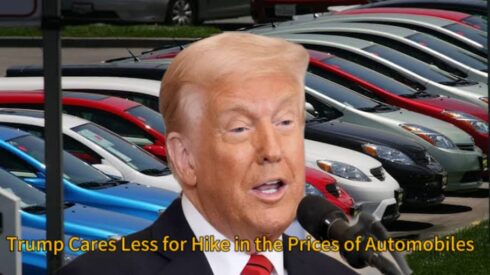President Donald Trump has made it clear that he is unfazed by potential price hikes in the automobile industry due to tariffs. In a recent speech, Trump stated he “couldn’t care less” if manufacturers raise car prices in response to new trade policies he has proposed. His remarks come amid growing concerns that higher tariffs on imported vehicles and parts could lead to increased costs for consumers.
Trump’s stance reflects his long-standing belief in protectionist trade policies aimed at boosting American manufacturing. While critics argue that tariffs could burden consumers with higher prices, Trump insists they will strengthen domestic production and reduce reliance on foreign-made vehicles. His comments suggest he is willing to see prices rise if it means achieving broader economic and trade goals.
Automakers and Economists Warn of Costly Consequences
Major automobile manufacturers and industry experts have voiced concerns over Trump’s position, warning that increased tariffs could drive up the cost of vehicles for American buyers. With a significant portion of car parts sourced from overseas, tariffs could lead to price hikes not just on foreign models but also on vehicles assembled in the U.S. that rely on imported components.
Economists caution that such a move could slow auto sales, weaken consumer purchasing power, and potentially trigger layoffs in the industry. Ford, General Motors, and other leading manufacturers have expressed frustration, arguing that trade barriers could undermine their competitiveness. If tariffs are implemented as Trump has suggested, car buyers could see thousands of dollars added to the price of new vehicles.
Trump Advocates for “America First” Approach Despite Pushback
Despite industry warnings, Trump remains firm in his commitment to an “America First” trade strategy. He argues that higher tariffs will ultimately pressure automakers to shift production to the U.S., creating jobs and reducing the trade deficit. His rhetoric suggests he sees short-term price increases as a necessary sacrifice for long-term economic gains.
Supporters of Trump’s plan believe that forcing automakers to manufacture more domestically will boost employment in the auto sector and strengthen American supply chains. However, opponents counter that the transition could be slow and painful, with consumers bearing the brunt of the cost in the meantime. The debate highlights the ongoing tension between protectionist policies and the realities of global trade.
Political and Consumer Reactions: Divided Opinions
Trump’s remarks have sparked mixed reactions, with some applauding his tough stance on trade while others worry about the financial strain on American households. Many of his supporters view tariffs as a step toward economic independence, believing that foreign competition has weakened U.S. industries for too long.
On the other hand, consumer advocacy groups warn that everyday Americans will be the ones to suffer the most from increased vehicle prices. With inflation already squeezing household budgets, additional costs on essential goods like cars could make transportation less affordable for millions. The policy debate continues to generate strong opinions from both sides of the political spectrum.
Global Trade Implications: How Other Nations Might Respond
If Trump follows through on his proposed tariffs, international trade partners are expected to retaliate, potentially sparking a new wave of trade wars. Countries such as China, Japan, and Germany, all of which export significant numbers of vehicles to the U.S., may impose their own tariffs on American goods in response.
Such a move could further strain diplomatic relations and disrupt global supply chains, leading to economic consequences beyond just the auto industry. The World Trade Organization and other global economic institutions may intervene to mediate trade disputes, but the long-term impact of Trump’s tariffs remains uncertain.
Long-Term Economic Impact: What Lies Ahead for the Auto Industry?
The proposed tariffs could reshape the automotive landscape, influencing pricing strategies, supply chains, and consumer demand for years to come. If higher costs push buyers toward used cars or alternative transportation methods, automakers may need to adjust their production and marketing strategies accordingly.
While some analysts argue that domestic manufacturing could benefit in the long run, others warn that the immediate impact may be painful for both businesses and consumers. The auto industry remains in a state of uncertainty as manufacturers, economists, and policymakers continue to assess the potential ripple effects of Trump’s trade policies.














